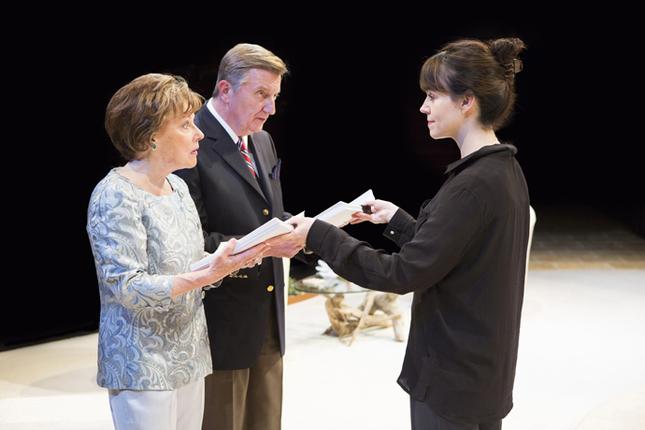‘Other Desert Cities’: Family Secrets in Palm Springs
By • September 12, 2013 0 1598

If you go to Arena Stage to see the compelling production of Jon Robin Baltz’s Tony Award-nominated play “Other Desert Cities”—and you really should, despite its occasional frustrations—check out some of your fellow audience members to see how and what they’re doing.
I went to a matinee performance recently and the house was filled with student groups—from high schools from around the area—as well as long-time patrons and season ticket holders and members in good standing of that generation which the stridently wounded and angry Brooke Wyeth rails against in a battle with her Southern California affluent parents, especially her mother Polly, close friend of Nancy Reagan’s back in the day.
“Other Desert Cities”—the reference is a dry, melancholy riff on California road signs directing you southward once you get past Palm Springs—is something of a familiar staple of a play. It’s a generational war pay in which the liberal novelist daughter Brooke, visiting her parents during Christmas in 2004 when the Iraq war was at its height, squares off against her parents with news that she’s written a memoir which focuses on the suicide of her beloved (by her) older brother, who was part of a group of left-wing radicals who ended up bombing a recruiting center which resulted in the death of a homeless janitor in the 1970s.
This kind of situation is a classic one in the theater—the revealing of family secrets long hidden or forgotten or still festering like an odious cancer with all the attendant grudges, resentments and unspoken feelings that come along for a catastrophic ride. Almost all family dramas from Ibsen to Miller, and especially O’Neill burn with secrets—just try to walk away from “Long Day’s Journey Into Night” or “The Iceman Cometh,” for that matter (a family play and a bar play), unscathed.
This comparison is not to suggest that Baltz is in that league yet. “Other Desert Cities” is more like a long weekend in the Palm Springs desert hideaway home of Polly and Lyman Wyeth who are hosting Brooke, a one-book novelist who spiraled into depression and now brings her memoir as a kind of brick of coal for Santa’s stocking, her surviving young brother Trip and aunt Silda Grauman, Polly’s sister and former screen-writing partner in house for another bout of staying off the sauce.
These are not by any means your typical American family. Polly—something of a socialite—and Lyman were shining figures in the Reagan GOP circles of Southern California, and Lyman was once a well known movie actor who played cops and cowboys, before being named an ambassador to somewhere by Reagan. Brother Trip is a television producer, his latest being one of those daytime judge shows in which amateurs decided the fate of cases. Brooke talks like a GOP-dreaded East Coast lefty and literati and lives in a cottage on the New England coast, her older British husband having left her.
The early rounds of this battle—and it is a battle set in a house featuring one of those white plastic Christmas trees, with a trip to the country club for dinner on the agenda—are frequently funny, smart and very cool and on the money, with most of the jabbing going on between mom and daughter along political and cultural lines while brother and dad act as referees. Lyman, famous for his death scenes as an actor, plays ones out for the family, and Larry Bryggman, a veteran theater and big and little screen character, turns the effort into a barrel of laughs.
These early goings are abetted triumphantly by a strong cast, ably and unobtrusively directed by Kyle Donnelly who has worked with most of the actors before. There are—blessedly—no heroes and heroines here, just deeply troubled souls having the usual amount of agonizing difficulty showing their love for each other, which nevertheless is very evident as are the resentments, those never-healed wounds.
Bryggman and Helen Carey—who starred in “Long Day’s Journey” at Arena—are the crown jewels in a pretty heady cast.
Bryggman is one of those actors we know by face instantly—we’ve seen him on this show or in this move and on daytime soap opera, but here he is a lion, a giant of a character, he’s so full of the burden of the pains he’s carried around for decades that he finally burst with pieces of heart and soul, like the blood spatter in one of those CSI shows.
Carey, who looks small and thinly elegant but is steely and regal, is one of the area’s acting treasures, not credited as much as she should have been. Until the free-for-all explosion of “the truth,” she dominates every scene she’s in just like her character. There’s love for Polly there, but, boy, it’s true tough love. In this atmosphere of two really great performances, Martha Hackett as sister Silda survives with perfectly placed irony and sarcasm, Scott Drummond as Trip with a long-suffering warmth, while Emily Donahoe has the thankless task of humanizing Brooke, who threatens to become a merciless true believer and whiner. She is the apparent victim here, but she’s also the accuser.
In this two-hour play, there’s one more cat to come out of the bag. If you’ve been paying attention, you’ve been hearing soft meows all along. It’s a manipulative kind of plotting—smart by way too much, and it could have derailed the play. But by that time, Bryggman, Carey, Donahoe, Drummond and Hackett have given you too many reasons to give a damn about the people on stage.
Baltz saves things with a kind of epilogue, a nine-years-later summation that remains resolutely ambiguous.
“I wanted more,” a woman told me as we left. In this, Baltz took the side of reality. Life just isn’t that tidy, or, as Sister Mary Ignatius once said in another play, “Of course, God answers all your prayers. It’s just that most of the time the answer is no.”
“Other Desert Cities” runs through May 26 in the Fichandler at Arena Stage, 1101 Sixth St., SW — ArenaStage.org.
- Helen Carey as Polly Wyeth, Larry Bryggman as Lyman Wyeth and Emily Donahoe as Brooke Wyeth in Arena Stage at the Mead Center for American Theater’s production of “Other Desert Cities” through May 26. | Scott Suchman



